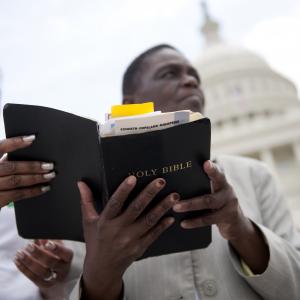Tim Suttle is a pastor, writer, musician, and self-proclaimed, "all-around huge nerd." He's the author of two books: An Evangelical Social Gospel? and his latest, Public Jesus, and he sometimes writes for the religion section at the Huffington Post (where this post originally appeared) and "On Faith" at the Washington Post. You can read more of Tim's writing on his blog, Paperback Theology. Once upon a time Tim was the founder and front-man of the Christian band Satellite Soul. And he considers himself lucky to be the Lead Pastor of Redemption Church in Olathe, Kan.
Posts By This Author
Meeting the Demands of a New Generation of Christian Leaders
The Christian Community Development Association (CCDA) has been a powerful force for Christian social action over the past decade. CCDA's leadership development, resources, and vision have been powerfully focused on helping pastors and community leaders facilitate the restoration of communities all over the country and around the world.
Born out of the traditions of the civil rights movement, CCDA is now engaging a new generation of pastors, prophets, and ministers. This next generation of CCDA will naturally look somewhat different from previous generations as they respond to the ever-changing landscape of our society. As it turns out, one major difference is a hunger among leaders for a more robust and powerful theological foundation from which to pursue ministry.
Practics has long dominated the field of Christian social action. What works? What strategies and techniques will actually bring about change in our community? These have been the central questions of past generations. However, among a new generation of church and community leaders, practical questions are not the sole concern, and in some cases not even the primary concern.
Public Jesus: How Churches Can Talk about Politics in an Election Year (Without Killing Each Other)
Learning to speak as a Christian is one of the most important and often ignored aspects of our discipleship. Nowhere is this fact more obvious than when churches try to talk about politics. When the small group leader makes a disparaging comment about Mitt Romney’s Mormon faith, or a car rolls into the church parking lot with a “NOBAMA” bumper sticker proudly displayed, what do we do?
Is bumper sticker propaganda and negativity the best we have to offer?
Admittedly it can be risky to talk about politics in the local church. All it takes is one idea or statement that flies in the face of someone’s deeply held convictions and that could be the end of our influence and the end of that person’s involvement in our ministry.
Still, the upcoming presidential election will be the defining cultural event of the next six months. If we completely ignore it we are missing a golden opportunity for discipleship.
How can churches have a healthy conversation about politics in the middle of a national election without demonizing the opposition and causing disunity?
I’ve been working on this question for months now, and as part of my preparation I wrote a book called Public Jesus. Here’s a little bit about what I’ve learned in the process:
1) Love the One You’re With
What is the Chief Political Concern of the Bible?
Both religion and politics are concerned with how we should organize societies. Yet the tendency for Christians has often been to begin with the politics and work backwards to find religious rationale for our political beliefs. As a result, most people read the Bible not to challenge our deeply held beliefs, but to affirm the decisions we've already made with our lives.
If you tend toward the political right you might say the chief political concern of the Scriptures has as much to do with smaller government, lower taxes, individual freedoms and gun rights as any explicit Christian concept.
If you tend toward the political left you might believe the chief political concern of the Scriptures has more to do with reproductive rights, religious pluralism, big government and labor unions.
Too often the ideologies of the secular right or the political left have been allowed set the terms for religious Christians.


